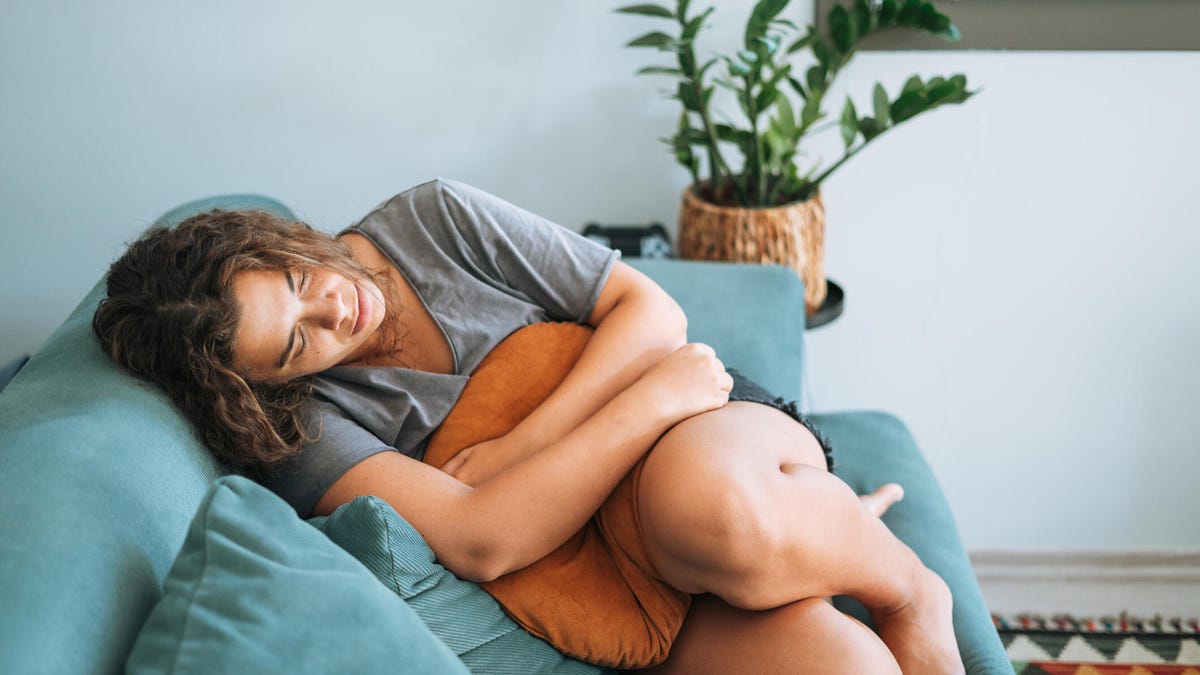Are period cramps keeping you up at night? You’re not alone. A 2023 study from BMC Women’s Health found that quality of sleep and menstruation are linked. Menstrual cramps (dysmenorrhea) are associated with insomnia, poor sleep quality and daytime sleepiness. It’s also common to experience sleep disruption during the premenstrual phase of your cycle. If you’re one of the 7 in 10 menstruating people who say their sleep changes right before their period starts, these tips may help.
You may struggle to sleep during your period
In addition to cramping and back pain, your period also ushers in a hormone shift. Yale Medicine explains that the relationship between your menstrual cycle and sleep is largely informed by estrogen and progesterone. These peak around the time you ovulate but drop drastically right before you start a period. This hormone dip can disrupt your sleep patterns and increase your temperature.
Additionally, people with premenstrual dysphoric disorder may have less melatonin in their body right before and during their period. Since this naturally occurring hormone is key to falling and staying asleep, a deficit could keep you up at night.
8 best ways to sleep while on your period
Over-the-counter pain medications can often alleviate some period symptoms. Still, as most people with periods know, pain relievers don’t offer instant relief and can cause stomach issues. The following tips for sleeping on your period are all natural.
Switch up your sleeping position
The best positions for sleep on your period are your side or back. Sleeping on your stomach may increase discomfort in your lower back, a region already affected by period cramps. If you sleep on your side, putting a pillow between your knees can align your pelvis and may decrease discomfort. When you’re on your back, a small pillow on your lower back may also make sleep easier. If you must sleep on your stomach, placing a small pillow at the hip level could help you stay aligned.
Use a heating pad
Heat therapy for period pain provides help in two ways. First, it helps relax the uterine muscles, and this may reduce cramping. Second, it promotes blood circulation to your reproductive organs, which may also offer pain relief. Use a heating pad or an electric blanket on the area when you’re trying to fall asleep; you can place it under your body if you’re a stomach sleeper. Side sleepers may benefit from a heating pad that can be secured around their body with velcro.
Reduce caffeine, alcohol and sugar intake
Certain food and beverage ingredients may increase period insomnia. Not only can caffeine make you too alert to fall asleep, but it also narrows your blood vessels which could make your uterus contract more. Alcohol and sugar may increase inflammation and worsen menstrual symptoms, too.
Try yoga before bed
Yoga stretches can offer muscle pain relief. Nationwide Children’s Hospital recommends doing a few yoga stretches when you’re just out of a shower or bath and your muscles are warm. They say the cobra, cat, cow and fish poses are especially good for cramp relief.
Stay hydrated
A simple habit change like drinking more water could also lead to better sleep for people with periods. Being dehydrated increases the likelihood of muscle cramps and headaches. Moreover, when you sleep poorly, your body is more likely to expel water it would normally retain. This just makes your dehydration worse.
Eat enough protein and complex carbohydrates
Both protein and complex carbs can help you avoid disturbed sleep during your period. Protein releases tryptophan, an amino acid that helps your body generate both melatonin and serotonin. Meanwhile, complex carbohydrates regulate blood sugar levels.
Turn on a fan
When your estrogen and progesterone drop right before your period, your internal temperature can go up. If you already sleep hot, you may be sensitive to this shift. Try cooling down by keeping a fan near your bed.
Take a warm shower or bath
Relaxing your muscles before bed can help you drift off to sleep more easily. A good soak in the bathtub or hot shower may release tension in your abdominal and back muscles and reduce cramping at night time.
Quality sleep during your period is possible
You don’t have to suffer from insomnia when you’re on your period. Remaining mindful of your temperature, diet habits and hydration may help. New tech like the Oura Ring may also help you better understand your cycle and temperature changes. If you experience severe period pain that can’t be mitigated by at-home tips, talk with your doctor.
